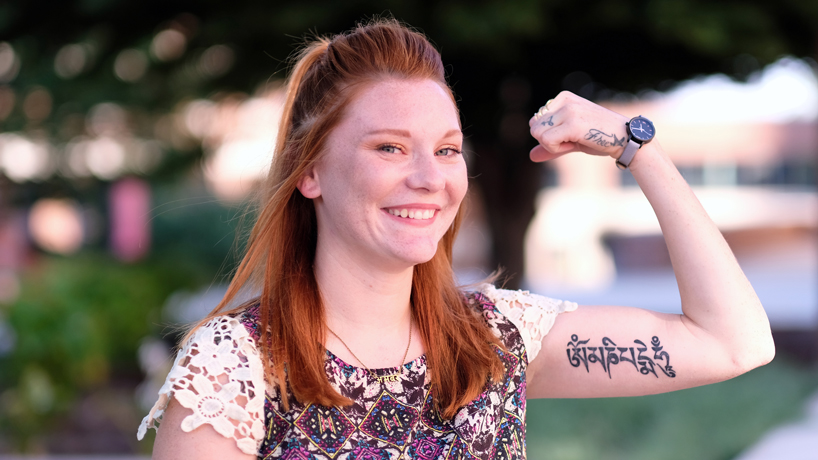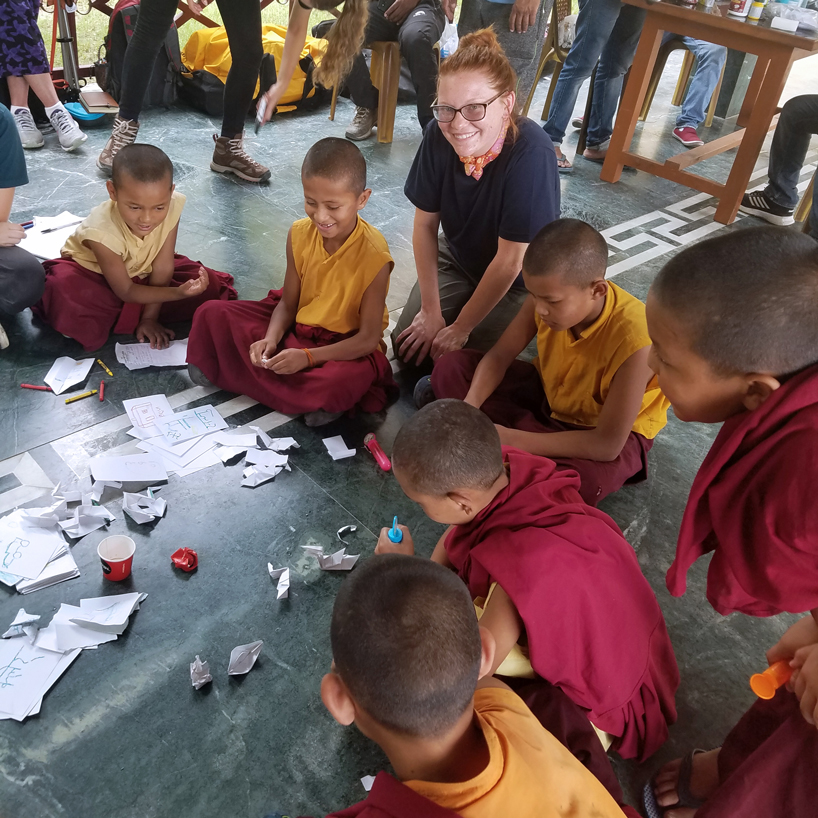
Anthropology major Amber McDaniel had a mantra of compassion tattooed on her arm following her trip with the Himalayan Health Exchange. The phrase translated from Tibetan means “the jewel within the center of the lotus.” (Photo by August Jennewein)
Amber McDaniel’s journey began in June, when she boarded a plane in St. Louis en route to the Himalayas in northwest India, and ended six weeks later upon her return with a 400-page journal, 2,000 photos and clearer sense of self.
McDaniel, a 30-year-old anthropology major at the University of Missouri–St. Louis, was among 30 students participating in the 2018 Himalayan Health Exchange expedition into the Indian Himalayas and Indo-Tibetan borderlands. Together, health-care professionals and students provided hands-on care to underserved populations in some of the most remote areas of the world. McDaniel was one of five non-medical students chosen for the team.
“It was an incredible journey,” McDaniel says. “I traveled some of the world’s most dangerous roads in minivans, camped 11,000 feet above sea level near the snow-covered peaks of the Himalayas, stayed in multiple monasteries with Buddhist monks, got invited to a Tibetan Hindu wedding reception, explored Kibber – one of the highest permanent human settlements – and helped treat nearly 900 patients.”

Amber McDaniel entertains a group of children as they await medical exams at a monastery in Kullu, India. (Photo courtesy of Amber McDaniel)
McDaniel played a dual role during the expedition. She assisted at temporary medical clinics established in monasteries by coordinating appointments, verifying vital signs and helping distribute prescribed medications. She also explored communities with a staff anthropologist to learn more about the cultures and traditions of local residents, documenting the conditions that affect their health and health-care decisions.
Among the most striking factors, McDaniel says, were the extreme poverty and pollution. The Himalayas have increasingly become a tourist destination, leaving the region with more human and solid waste than it can manage. McDaniel is including a discussion of pollution issues in a report she’s creating for a UMSL independent study course.
“It’s a real health hazard,” she says.
McDaniel began preparing for the expedition nearly a year ago by buying backpacking equipment, hiking in the gear to ensure she could handle the trip’s physical demands and researching the various cultures and religions she’d likely encounter.
“I did not grow up religious,” she says. “But I’ve always been fascinated by other cultures and religions. That’s one of the reasons I was drawn to this adventure.”
McDaniel is a typical UMSL student in many ways. She grew up in the St. Louis region, graduated from nearby Ritenour High School and started working full time, first in pet care and then with the Missouri Department of Conservation. She entered UMSL’s undergraduate biology program because of her interest in conservation and ecology, but an introductory anthropology class shifted her focus.
“The first anthropology course changed my life,” McDaniel says. “I switched majors because anthropology is a very flexible degree with many different career paths.”
McDaniel’s passion has evolved toward the medical side of anthropology, and she plans to pursue a master’s degree in public health after graduating from UMSL.
“Everyone deserves a right to have a healthy life,” she says. “It’s still very new to me, but I know I’m on the right road toward affecting health policy and providing basic health-care services.”
This story was originally published in the fall 2018 issue of UMSL Magazine. If you have a story idea for UMSL Magazine, email magazine@umsl.edu.














